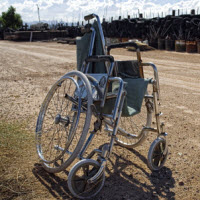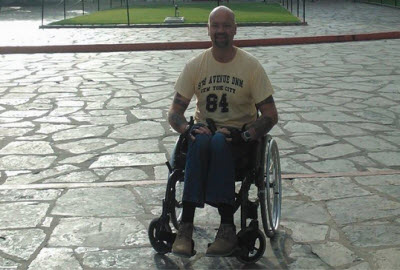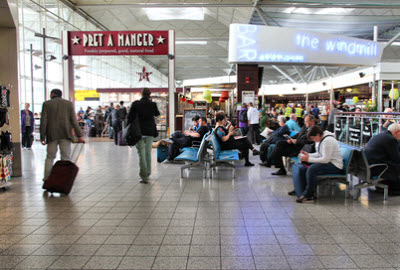Air Travel Operators Made Me Feel Worthless, Disabled Man says
- Written by Roberto Castiglioni
 Airports and airlines must improve their complaint handling procedures to avoid humiliating disabled people.
Airports and airlines must improve their complaint handling procedures to avoid humiliating disabled people.
In an ideal world air travel should always be a seamless experience. However, adverse weather conditions, technical delays or other external factors may spoil the journey.
In most cases, air travel operators provide on-the-spot support to manage the emergency. However, this is not always the case with missing or damaged checked luggage.
This is magnified when the damaged item is an essential mobility device like a wheelchair. We can all live without our favourite shirts or pants, but we become immobile without the resources to go about our daily routine.
The unfortunate event becomes almost unbearable when a complaint is poorly handled, like the testimony of Mr Darren Smith perfectly describes.
“After becoming paraplegic two half years ago my life passion for travel had become a lot more difficult,” Darren said. “I  needed to build my confidence so arranged five trips to Slovakia from Stansted using Ryanair.”
needed to build my confidence so arranged five trips to Slovakia from Stansted using Ryanair.”
Darren travelled to Slovakia in November 2012. “During my first trip I was treated extremely unfairly by the airport staff at Stansted enforcing my fears and lack of confidence traveling as a disabled person. I was made to feel isolated and worthless.”
His experience was just about to get worse. “To add to this awful experience on my return trip from Slovakia my wheelchair was damaged to the point that using my chair was unsafe.”
Air travel equality law, (EC)1107/2006, assigns airports the duty to give passengers a replacement wheelchair when a personal mobility device is lost or stolen. “On reporting the damage immediately to airport personnel, neither Ryanair nor Stansted Airport team wanted to accept responsibility or indeed offer me any help in resolving my immediate problem of safely getting to my car.”
As we know, things can go wrong for a number of reasons. How the air travel operator handles the aftermath of the incident is of paramount importance. “Until getting in touch with Reduced Mobility Rights neither Stansted airport nor Ryanair were responding to me in any way to the point that I was convinced it was their general tactic in that eventually you lose momentum and just give up,” Darren said.
 Darren approached us with his problem in January 2013. “Reduced Mobility Rights gave me hope and faith, but most of all I didn't feel alone and insignificant,” Darren said. “They were professional and focused in achieving a successful conclusion to situations such as mine; They used every possible means available to them, even engaging members of Parliament highlighting my situation.”
Darren approached us with his problem in January 2013. “Reduced Mobility Rights gave me hope and faith, but most of all I didn't feel alone and insignificant,” Darren said. “They were professional and focused in achieving a successful conclusion to situations such as mine; They used every possible means available to them, even engaging members of Parliament highlighting my situation.”
Eight months after the incident and three weeks after admitting to not providing a replacement wheelchair, Stansted airport apologised and paid out compensation for the damage to Darren's wheelchair.
“Thanks to Reduced Mobility Rights my issues were resolved with justice being achieved, which again made me think that I wasn't insignificant and that I do have rights,” Darren said. “Above all for me the most significant thing is that they gave me the confidence to embrace my passion for travel for I, as do every disabled person, have just as much right to expect good service and if things do go wrong then as when I was able bodied I have the right to complain and be treated fairly.”
As we said, incidents can happen. However, there is no justification to put a person through the misery Darren Smith experienced.
Following Darren Smith incident Stansted airport began reviewing its complaint handling process. Passengers should be treated with dignity from the onset of the process rather than being belittled or simply ignored like in Darren’s case.
Ryanair announced changes that will prevent passengers from having to go through Darren’s ordeal. “We have recently introduced another step on our process for passengers with reduced mobility,” Ryanair deputy customer service manager Fiona Kearns said. “When mobility equipment is damaged in transit we have instructed airports to alert us directly to the problem. “
Normally, airlines ask passengers to contact Lost and Found desks at airports, where they are handed a form called PIR, Property Irregularity Report. Passengers are then asked to file a new claim with the airline within a pre-set time-frame, usually seven days.
“We proactively contact affected passengers to ensure that they are aware of the processes we have relating to repair and replacement and ensure that, if required, they have a replacement until their own device is operational again,” Mrs Kearns explained.
First of its kind, Ryanair’s new procedure sets the new benchmark in customer care for passengers with reduced mobility who have their wheelchair damaged or lost.










